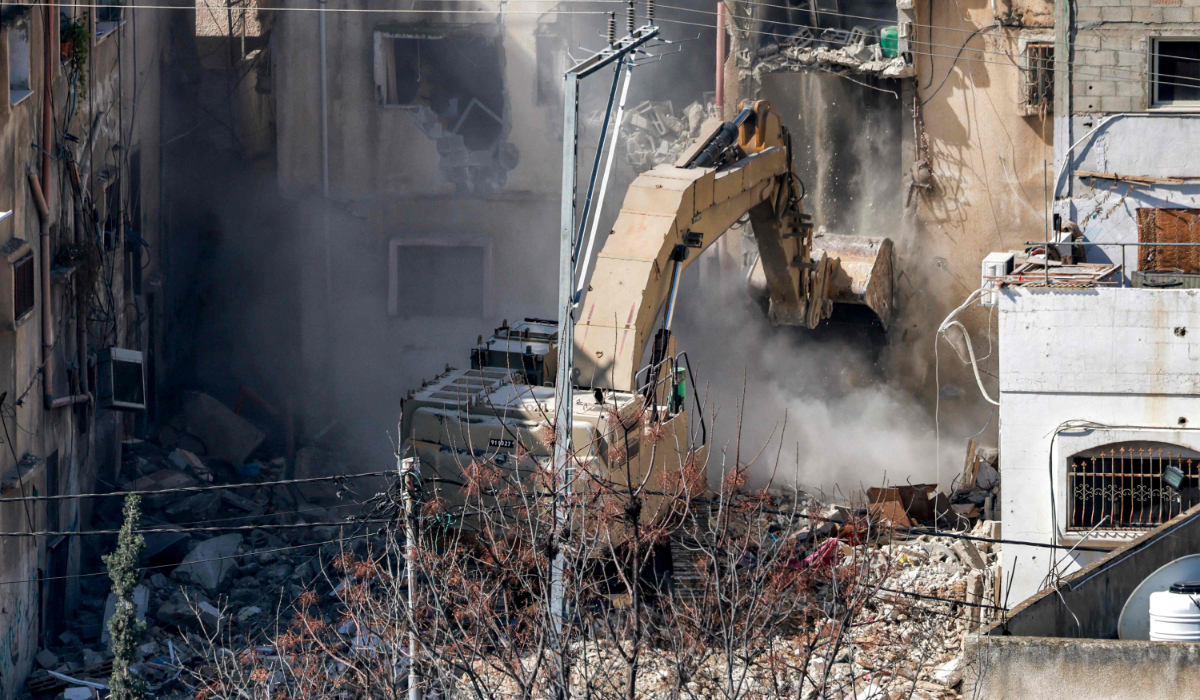IRBIL: Waiting at home in Iraqi Kurdistan, Khadija Hussein holds faint hope of hearing word of further survivors from the shipwrecked vessel that carried 11 of her family members from neighboring Turkiye.
Khadija’s nephew Rebwar, his sister-in-law Mojdeh and both their families were aboard a sailing boat that sank overnight between Sunday and Monday off the Italian coast.
Twelve people were plucked from the water after the boat sank around 120 nautical miles off Calabria, one of whom died after disembarking. More than 60 remain unaccounted for after six bodies were retrieved on Wednesday from the sea by the Italian coast guard.
“What’s clear is that Mojdeh survived. We spoke to her on the phone,” the 54-year-old housewife told AFP.
Mojdeh’s son and another child from the family are also known to have survived — the eight other relatives of Khadija who were onboard are still unaccounted for.
“We have no further details,” Khadija said, a black veil draped over her hair.
On a moldering wall at the entrance to the family home in Irbil, the capital of the autonomous Kurdistan region in northern Iraq, a poster announces a vigil organized on Wednesday to receive condolences.
Two family photos on display showed the victims, parents and children smiling broadly and dressed in their best clothes. Mojdeh is with her husband Abdel Qader, a cab driver. Her sister Hiro is pictured with her husband Rebwar, a blacksmith.
The two couples had almost changed their minds and decided not to depart.
“They had informed the parents, and everyone was relieved,” Khadija explained, but after an insistent intervention by a people smuggler, the group had a change of heart.
They were supposed to make contact with the family in Irbil when they arrived in Europe to start their new life.
“Hours went by, and we heard nothing more,” Khadija said.
The smuggler, meanwhile, had switched off their phone
News of deaths like these on Europe’s migrant routes has become all too common in the autonomous Kurdish region. The area has been touched by other tragedies, whether on the English Channel or in the frozen forests of Belarus.
In the Irbil schoolyard requisitioned for the vigil, dozens of women huddle together, seated under a tent, all dressed in black, their features drawn, in a silence broken by the cries of children.
At the mosque, the men of the family welcomed dozens of visitors who had come to pay their respects in a reception room, listening to verses from the Qur'an.
Kamal Hamad, Rebwar’s father, explained that he spoke to his son on Wednesday, 12 June, when he was already on the boat. His grief is compounded by incomprehension.
“They knew full well that traveling by sea in this way meant certain death,” the 60-year-old said. “Why leave? In our country it’s better than elsewhere.”
In an unstable Iraq, the Kurdish region has always presented an image of relative prosperity and stability. Property developments, highways, universities and private schools are all under construction.
But the autonomous region, like the rest of the resource-rich country, also suffers from endemic corruption, the cronyism of the ruling clans and an economic stasis that has left its young people disillusioned.
A Gallup poll from 2022 showed two out of every three Kurdish residents thought it would be difficult to find a job.
According to the International Organization for Migration, some 3,155 migrants died or disappeared in the Mediterranean last year.
The president of the Association of Migrants Returned from Europe, Bakr Ali, told AFP that the sailing boat was carrying a “majority of Kurds from Iraq and Iran.”
“There were also a number of Afghans,” he said, adding that the boat had set sail from Bodrum in Turkiye.
Bakhtiar Qader, Rebwar’s cousin, said some 30 people from autonomous Kurdistan were among those traveling on the vessel.
He also doesn’t understand the stubbornness of the two couples. Especially as they “had their own house, car, children and jobs.”
“I, like their parents and friends, tried to talk them out of it,” he said.
“But they wouldn’t listen,” the 40-year-old, wearing a black shirt and a salt-and-pepper beard explained.
“They didn’t know that death was waiting for them.”
Iraqi Kurds mourn loved ones lost on Mediterranean migrant route
https://arab.news/v485d
Iraqi Kurds mourn loved ones lost on Mediterranean migrant route

- In unstable Iraq, Kurdish region has always presented image of relative prosperity and stability
- But autonomous region, like rest of the resource-rich country, also suffers from endemic corruption




























